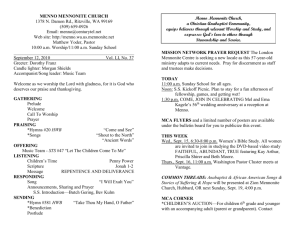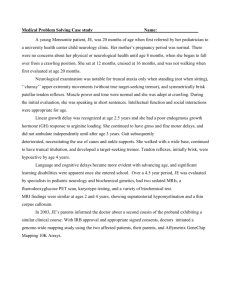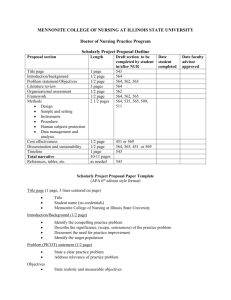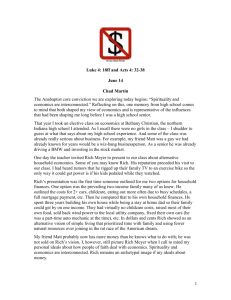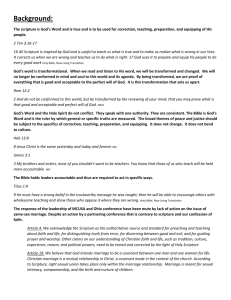Endorsements
advertisement
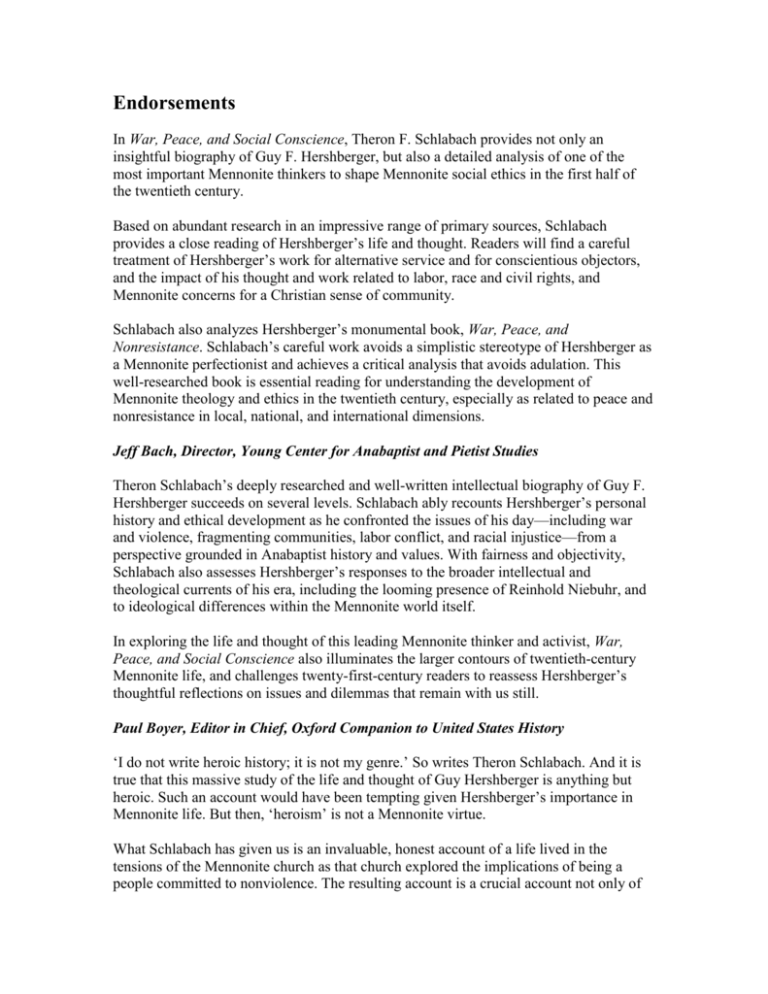
Endorsements In War, Peace, and Social Conscience, Theron F. Schlabach provides not only an insightful biography of Guy F. Hershberger, but also a detailed analysis of one of the most important Mennonite thinkers to shape Mennonite social ethics in the first half of the twentieth century. Based on abundant research in an impressive range of primary sources, Schlabach provides a close reading of Hershberger’s life and thought. Readers will find a careful treatment of Hershberger’s work for alternative service and for conscientious objectors, and the impact of his thought and work related to labor, race and civil rights, and Mennonite concerns for a Christian sense of community. Schlabach also analyzes Hershberger’s monumental book, War, Peace, and Nonresistance. Schlabach’s careful work avoids a simplistic stereotype of Hershberger as a Mennonite perfectionist and achieves a critical analysis that avoids adulation. This well-researched book is essential reading for understanding the development of Mennonite theology and ethics in the twentieth century, especially as related to peace and nonresistance in local, national, and international dimensions. Jeff Bach, Director, Young Center for Anabaptist and Pietist Studies Theron Schlabach’s deeply researched and well-written intellectual biography of Guy F. Hershberger succeeds on several levels. Schlabach ably recounts Hershberger’s personal history and ethical development as he confronted the issues of his day—including war and violence, fragmenting communities, labor conflict, and racial injustice—from a perspective grounded in Anabaptist history and values. With fairness and objectivity, Schlabach also assesses Hershberger’s responses to the broader intellectual and theological currents of his era, including the looming presence of Reinhold Niebuhr, and to ideological differences within the Mennonite world itself. In exploring the life and thought of this leading Mennonite thinker and activist, War, Peace, and Social Conscience also illuminates the larger contours of twentieth-century Mennonite life, and challenges twenty-first-century readers to reassess Hershberger’s thoughtful reflections on issues and dilemmas that remain with us still. Paul Boyer, Editor in Chief, Oxford Companion to United States History ‘I do not write heroic history; it is not my genre.’ So writes Theron Schlabach. And it is true that this massive study of the life and thought of Guy Hershberger is anything but heroic. Such an account would have been tempting given Hershberger’s importance in Mennonite life. But then, ‘heroism’ is not a Mennonite virtue. What Schlabach has given us is an invaluable, honest account of a life lived in the tensions of the Mennonite church as that church explored the implications of being a people committed to nonviolence. The resulting account is a crucial account not only of Hershberger’s life, but of Mennonite life—an accounting I hope non-Mennonites will find instructive because it may help them understand Mennonites, but more importantly how Mennonites help us better understand what being Christian entails. Stanley Hauerwas, Professor of Theological Ethics, Duke Divinity School Through meticulous research and insightful analysis, Theron F. Schlabach allows us to see how Guy F. Hershberger pushed Mennonites to embody the gospel in the community of faith and by so doing testify that the gospel does have a social ethic. We are indebted to Schlabach for giving us a glimpse of Hershberger in his multidimensionality, creativity, and faithfulness. We have much to learn from Hershberger as we seek a faithful social relevance in our time. This book demonstrates that in a great many ways Hershberger was preserving his tradition while creatively exploring its implications and pushing out its boundaries. Ted Koontz, Professor of Ethics, Associated Mennonite Biblical Seminary In this comprehensive biography, Theron F. Schlabach explores one of the giants of twentieth-century Mennonite thought. In studying the dynamic of this teacher-leader, Schlabach reconstructs the unique stance of the Mennonite peace ethic, which has continuing relevance in the twenty-first century. John A. Lapp, Executive Secretary Emeritus, Mennonite Central Committee Each generation of Anabaptists wrestles to reconcile their faith with their circumstance. Hershberger dug down deep into historic Anabaptist principles of pacifism and nurtured the growth of new peace programs to, in effect, ‘institutionalize pacifism.’ While theologians in his day were writing about peace, Hershberger’s writing and work focused on how Anabaptists of his day could be faithful to their pacifist heritage in practice. If you listen closely to the work and words of Mennonite peacebuilders today, you’ll find echoes of the life and works of Guy Hershberger. Like Guy, Anabaptists today should reflect on how to be faithful to our past while pushing out a practical, everyday ethics for living in today’s world to bring both a private and a public peace. This book is like a handrail on a rocky stairway, steadying us today on the journey toward a practical pacifist faith. Lisa Schirch, Professor of Peacebuilding, Eastern Mennonite University Schlabach’s thorough, careful research reveals the many aspects of Guy F. Hershberger’s life. The book illumines not only Hershberger’s experiences, but also the church and institutions in which he operated. Schlabach aptly demonstrates how Hershberger navigated his changing times, all the while seeking to be faithful, biblical, and committed to the church. Throughout it all shines Hershberger’s ability to translate theology and ethics into the practical decisions of everyday life. Whether or not one agrees with all of Hershberger’s positions, Christians seeking to live faithfully in the twenty-first century will be wise to pay attention to the lessons contained here.” Rachelle Lyndaker Schlabach, Director, Washington Office of Mennonite Central Committee U.S. Guy F. Hershberger was the primary crafter of the ‘nonresistance’ narrative that became the old Mennonite Church consensus in the mid-twentieth century. But Theron Schlabach tells us Hershberger was much more. Although in the shadow of more high-profile leaders like Harold Bender, Hershberger envisioned alternative service options long before World War II, helped to shape the formation of Mennonite Mutual Aid, promoted the ‘Mennonite community’ movement, and nudged Mennonites toward greater openness to Martin Luther King’s call for justice for African Americans. In this important study on a an era in the Mennonite church dominated by larger-than-life leaders who ran the church through ‘interlocking directorates,’ Theron Schlabach provides an unvarnished, exhaustively researched study of the life and influence of one of the more humble, albeit tenacious, of these leaders. War, Peace, and Social Conscience should be read alongside Harold S. Bender by Albert Keim. Sam Steiner, Managing Editor, Global Anabaptist Mennonite Encyclopedia Online (GAMEO) Back to Main Page
